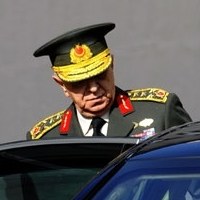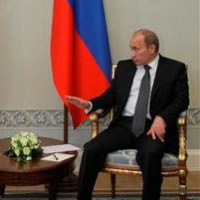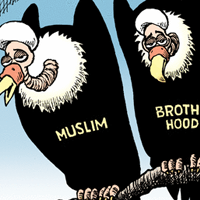![]()
Tue, Jan 24, 2012 | Rubin Reports | By Barry Rubin
Where the “Counter-Obama” View of the Middle East is Right and Where It’s Wrong
Jackson Diehl is by far the best journalist writing in the mass media about the Middle East. In a recent column he tries to find some middle ground between the dominant ideas — that Islamist regimes are no problem at all and that the Muslim Brotherhood is really moderate — and what he defines as an excessively extreme conservative and Republican analysis.
While I don’t quite agree with him, there is much of merit in his dichotomy. We should all learn from it even though I’m going to suggest that it needs to be adjusted. Even if Obama’s critics are on the right side about the Middle East and generally understand what’s happening, many of them also make factual and analytical mistakes that undermine their credibility and may sometimes subvert their policies if they win office.
In addition, Diehl reminds us (how rarely that happens nowadays!) how good it feels to debate with people who actually think about the issues and cite evidence even if we disagree with them. He actually believes that there is merit on both sides of the argument, again an attempt at balance that often seems to be close to extinction in this sad era.
Diehl begins with a highly critical account of a Fox news host and Governor Rick Perry’s hard-hitting but flawed account of contemporary Turkey.
The former said of Turkey — in Diehl’s view, a “mostly accurate but extremely one-sided description” — that since an “Islamist-oriented party took over . . . the murder rate of women has increased 1,400 percent. Press freedom has declined to the level of Russia. [Prime Minister Recep Erdogan] has embraced Hamas, and Turkey has threatened military force against both Israel and Cyprus.”
Diehl provides what he sees to be the other side, that the Turkish government:
“has just stationed an advanced radar on its territory that could be used to track and shoot down missiles from Iran; that joined the NATO operation against Moammar Gaddafi [sic] in Libya; that has become the host of the opposition to Syrian dictator Bashar al-Assad; and that, having repeatedly won free democratic elections, amended Turkey’s constitution to expand rights for women, ethnic minorities and unions.”
Diehl, to his credit (it’s amazing how rare any balanced account is in the mass media nowadays!) continues, “that, too, was a one-sided account of the Erdogan record. But that is precisely the point: Turkey has become a complex, dynamic, difficult, sometimes infuriating, sometimes very helpful and indisputably important ally of the United States.”
Now Diehl presented five items as being to the credit of Erdogan’s regime. But let’s take them one at a time:
— Advanced radar. True, but it was with extreme reluctance, statements that it would not be used against Iran, and the demand that no information from this installation be supplied to Israel. Arguably a plus but less of one than it might seem.
— Libya operation. True but the Turkish regime’s goal was to have an Islamist regime installed in Libya, a government whose anti-Western policy would not bother Erdogan a bit. Hence, not exactly a wonderful gesture.
— Syria. Same as above, only worse. This is not a pro-democratic policy but a pro-Islamist policy.
— Repeatedly won free elections. Absolutely true but how does this undermine the Fox journalist, Bret Baier’s, analysis?
— Expanded rights. It is true that the constitutional reform offered some real alleviations of historic Turkish statism but, as many liberal critics in Turkey pointed out, the candy coating concealed major steps to subordinate the judiciary to the current government. Arguably, these changes are resulting in diminished rights for Turks.
In other words, if the case against the Turkish regime isn’t 100 percent, it’s far closer to that than half-and-half.
Diehl continues:
“The reality is that, like it or not, ‘Islamist-oriented’ governments are about to become the new normal in a region dominated for decades by secular autocrats and pro-American generals. So the crude bias about Muslim movements that is baked into the worldview of many U.S. conservatives — that they are inevitably fundamentalist, anti-democratic, anti-Israel and anti-American, if not explicitly “terrorist” — has become a serious liability. If heeded, it will make it impossible for this administration and future ones to navigate the region’s new politics and preserve crucial alliances.”
Unfortunately, Diehl did not repeat here his discussion of how both sides are too “one-sided” in this debate. After all, while I and a lot of pro-Western forces in the Middle East don’t like what’s happening, the Obama Administration does. It’s one thing to say that we have no choice — that is often a valid point in policy debates — and quite another to show that the Western political establishment is helping create a bad situation.
Leaving that aside, it is true that much of the analysis of Islam, Islamism, and Middle East politics on the right is too crude. Yet in part this is a reaction to the failure of the mass media, experts, the government, and the policy establishment to offer a reasonable picture. By portraying Islam as a perfect “religion of peace” and revolutionary Islamism as moderate, these institutions have created a suspicious opposition ready to go to another extreme.
But the truth does not lie completely in the middle either. Diehl continues:
“Some Islamic movements may turn out like Hamas and Hezbollah — implacably hostile. But others, like Egypt’s Muslim Brotherhood, are likely to weave through an ambiguous middle ground, trying to balance the need for Western investment and the secular aspirations of their populations with their religious ideology. The right way to respond to them is to be nimble: tolerate some turbulence, roll with some punches, push back against others and keep pressing leaders to stick to democratic principles.”
His last sentence is quite correct. What’s needed is a policy of maneuver and pressure, not one of sledgehammer negativity. At the same time, though, it is quite reasonable to doubt that the Brotherhood will weave through a middle ground. How can one say their populations have “secular aspirations” when they don’t vote that way? Of course, Tunisia is different from Libya or Egypt but unfortunately the last two are the strategically significant countries.
There are two things that the Western establishment simply cannot seem to admit:
— There can be democratic elections in which a majority votes for what is in effect a dictatorial government.
— There can be populations where a majority or a sector large enough to dominate have radical Islamist, not secular, aspirations.
Can the Brotherhood be constrained by a combination of tough Western policies, a nationalist president in Egypt, the carrots of military aid and investment? Maybe. But one thing for sure: Obama policy, with its apologies, concessions, and coddling can’t do it.
In addition, one should add into that alternative policy the following elements: Alliance with regional anti-Islamist forces (Israel, Saudi Arabia and the GCC states, Jordan, and Algeria); strong support for democratic opposition movements (in Turkey, Lebanon, Iran, and Syria); figuring out how to help real moderate forces (Egypt, Tunisia, Libya); and an energetic strategy to counter the radicals’ aggressive and subversive foreign policy efforts.
At least one can have a serious dialogue with Diehl, who is actually thinking about the complexities of the issues involved. I simply cannot think of a single other mass media journalist — not one — who either thinks or writes as he does. That’s pretty devastating.
Moreover, since the columns and airtime of the mass media is basically closed for contrasting views, how can one possibly reach the same audience, especially since part of the mass media’s propaganda mission is to caricature the critics by highlighting the dumbest statements (and painting dissent as Islamophobia)?
Equally, though, Diehl’s challenge to the critics of the mainstream thinking on the Middle East is also very serious. Unless Republican presidential candidates, conservative thinkers, and those holding alternative views can develop an accurate and sophisticated analysis, they are not going to win this debate or develop a better strategy.



 RSS
RSS











Where the “Counter-Obama” View of the Middle East is Right and Where It’s Wrong | Middle East, Israe http://t.co/VK3Ln6T3
Where the “Counter-Obama” View of the Middle East is Right and Where It’s Wrong | Middle East, Israe http://t.co/VK3Ln6T3